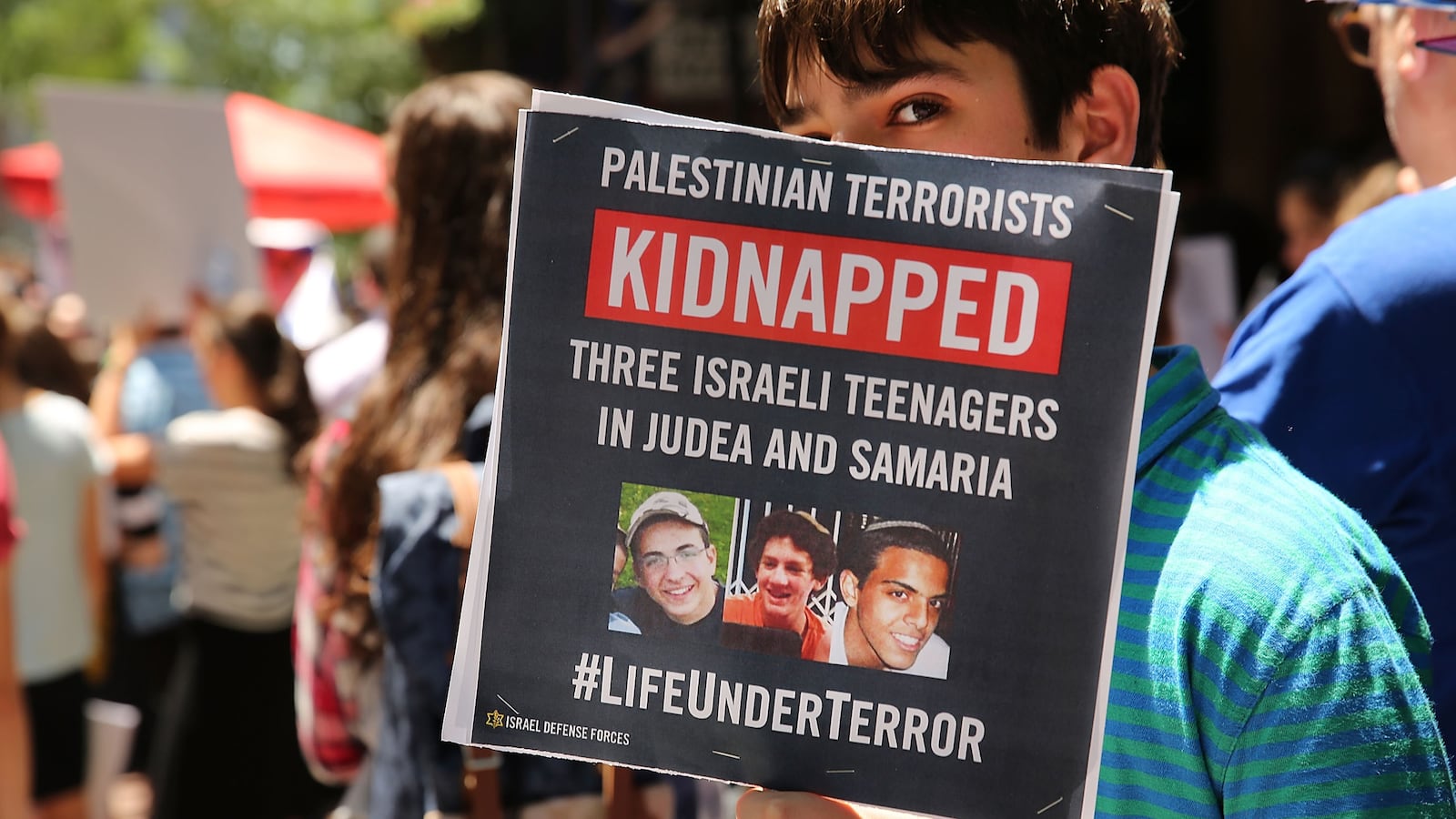TEL AVIV, Israel — Normally, or rather ideally, when young people are abducted and then murdered there is outrage and concern for the family of the deceased. In Israel, the atmosphere is no different. Israel mourns the loss of three boys, Naftali Frenkel, Eyal Yifrach, and Gil-ad Shaer—and the rest of the world responds with a casual indifference.
“That’s what happens in an apartheid state.”
“This is what happens when you hitchhike.”
“They provoked their kidnappers.”
I will not make the argument that should these three boys have been foreigners traveling in Israel or young women, the world’s reaction would be different. These things are never for sure—we cannot assume based on hypotheticals. We can only analyze based on true fact.
On the evening that the three boys’ deaths were confirmed, I sat in a cafe with a friend of mine, a leftist who didn’t serve his mandatory service time in the IDF. I asked my friend, who is staunchly uninterested in what is happening around him politically, and vehemently supportive of a two-state solution, what he thought of the murder.
“It’s better that they are dead,” he shrugged as he sipped his vodka.
“What do you mean?! How on earth could you be happy that these children were killed?” I asked, shocked. As a non-Israeli, my brain is still wrapping around the psychology of people who grow up in a country that is always at war, and always under attack, and the normality of death.
“Then we don’t have to trade any prisoners. It’s better that they are bodies—we have leverage against Hamas.”
When Gilad Shalit was released by his Palestinian captors, the Israelis paid a very high price: the release of 1,027 prisoners. Interestingly enough, the two alleged captors of Naftali, Eyal and Gil-ad were prisoners released in the exchange. The Israelis have taken advantage of the abduction to regain losses on their side from the exchange and to use this opportunity to derail stability within Hamas. The two captors are also affiliated with Hamas. In the past two-plus weeks that Israel has been searching for these boys they have arrested up to 419 Palestinians, of whom 59 were traded for Gilad Shalit and 279 are said to be Hamas operatives.
Furthermore, a phone call was released. Gil-ad Shaer called the police and told them he had been kidnapped. Unsure of what to do, the operator asked a superior what the correct move would be. The phone call was dismissed as a prank, despite the sound of gunfire in the background.
Although there is a theory that the boys were murdered after the terrorists panicked, hearing Gil-ad on the phone, there is a new theory: murder was the intent. The terrorists can be heard in the background, joyously exclaiming, “thalaatha!” which means “three” in Arabic. It took 18 days to find the bodies. The murderers have yet to be found.
An Israeli temper is hot, passionate and quick. The IDF has already destroyed the West Bank home of Ziad Awad, a Hamas terrorist who had gunned down a car with an Israeli family en route to a Passover seder in Hebron. Lt. Col. Peter Lerner said the demolition of Awad’s home was intended to serve as a deterrent. The destruction of Palestinian property, a practice which has not been used since 2008, is a warning to Hamas operatives and Palestinian locals. The campaign in Gaza will not be merely an effort to maintain peace—the campaign is tinged with feelings of revenge and contempt. The effort will be harder; more blood will be spilled.
The IDF is not the only force that would like to exact revenge. Israeli citizens are furious. Facebook is littered with emotional posts proclaiming that the boys will never be forgotten—a sad untruth, ’tis the nature of a place which is so used to violence and murder—one doesn’t simply learn how to move on from sadness, one must. These boys are a movement now, but in six months they will be a lesser-read Wikipedia article.
Again, the Israeli temper is hot and quick, sometimes reason becomes blinded and emotions take control. During the time of the three boys’ funeral, an angry mob formed in Jerusalem and began to attack Arab youths. Many were arrested, but still, an Arab teenager was murdered. His body was charred and showed signs of violence. Gandhi always warned against the practice of “an eye for an eye”, and he was absolutely correct—attacking the innocent is never correct. Peace will never come if there is a constant feeling of blood debt on both sides.
The police commissioner, Yohanan Danino, warned, “The police will not allow anyone to take the law into their own hands,” and pleaded with the public to show restraint. But an injured Israeli spirit is not one known for restraint. After about two years of relative peace in the region, Hamas threatens to open “the gates of Hell” and Netanyahu promises that “Hamas will pay, and Hamas will continue to pay.”
“We are humanitarians,” said the father of Eyal Yifrach in his eulogy, “We will not break. We will not give up. We’re here, and you can’t change that.”
Despite all of the anger and sadness sweeping the state of Israel currently, one can still turn to the youth for inspiration. Mohammad Zoabi, a cousin of Knesset member Haneen Zoabi (notorious for her comments about the abduction, saying the kidnappers were not terrorists and just frustrated with their lives as Palestinian Arabs), posted thoughts on Facebook that all in the region could learn a little from:
“I showed sympathy for the 3 Innocent Israelis who were kidnapped by terrorists.
“I got attacked, criticized and threatened by Arabs and Anti Israelis from all over the globe among them was; MK Haneen Zoabi. …
“My name is Mohammad Zoabi, 16 year old Israeli Zionist Arab Muslim;
Israeli—I was born in a country called Israel; same way French are born in France, Iranians in Iran. And hell yeah I’m proud for being Israeli
Zionist—Simply I believe in the Jewish people’s right of self determination in their homeland; The land of Israel.
Arab-My 1st mother language is Arabic; My Ethnic background is Arab.
Muslim—I believe in one God and respect all God’s prophets and religions; Moses (Judaism), Jesus (Christianity) and Mohammad (Islam)
I see myself as a human being above anything else, a human being who wants to create a better world for all.
I Mohammad Zoabi announce that I’m ready to give up my life for the sake of a better future for us, our children and all the coming generations of Mankind.
May Israel be blessed
May peace come upon us and all our Middle Eastren neighbors
May we have a better future full of Peace…”
From the mouths of babes…






